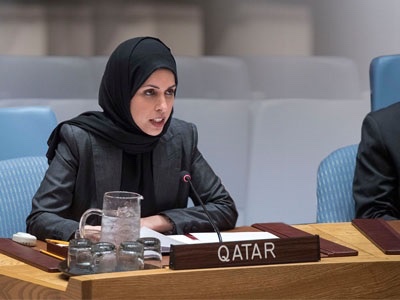Qatar Welcomes Constructive Initiatives to Reduce Escalation, Settle Disputes in Gulf Region through Dialogue

New York – Information Office – 21 October
The State of Qatar welcomed the constructive initiatives to find means toward de-scalation and settle differences through dialogue in the Gulf region, stressing the region's strategic importance and its serious endeavor towards resolving crises peacefully, achieving political and security stability and strengthening preventive diplomacy.
This came in a statement delivered by HE the Permanent Representative of the State of Qatar to the United Nations Ambassador Sheikha Alya bint Ahmed bin Saif Al-Thani at the UN Security Council Meeting on the Maintenance of International Peace and Security: Comprehensive Review of the Situation in the Arabian Gulf Region, convened by Russia which chairs the Council's works for this month led by HE Russian Foreign Minister Sergey Lavrov.
HE Sheikha Alya expressed the State of Qatar's welcome of constructive initiatives to find means toward de-scalation and settle differences through dialogue, stressing that resolving differences through dialogue is the core of Qatar's foreign policy and the approach it has followed in dealing with the Gulf crisis with wisdom and the principles of peaceful settlement of disputes. She also stressed that this is the State of Qatar's policy since the beginning of the crisis, as HH the Amir Sheikh Tamim bin Hamad Al-Thani called for a serious and constructive dialogue based on common interests, good neighborliness, mutual respect for the sovereignty, independence and unity of States and non-interference in their internal affairs, and expressed his commitment to mediation, especially the efforts of HH the late Amir of the State of Kuwait Sheikh Sabah Al-Ahmad Al-Jaber Al-Sabah and the efforts of brotherly and friendly countries.
Her Excellency continued that the State of Qatar is working to preserve its interests while adhering to the established principles, pointing out that the common interests and destiny of the countries of the region are much more than what divides them, reiterating the State of Qatar's firm conviction that there is no way to achieve sustainable peace in the region except by settling disputes through an approach to resolving crises within collective frameworks.
HE the Ambassador also affirmed the State of Qatar's keenness to maintain the Gulf Cooperation Council (GCC), as a model for a subregional framework for cooperation and coordination, adding that disputes between its members is supposed to be settled under its umbrella, as this is one of the purposes for which it was originally established.
She pointed out that before the escalation of the crises in the Gulf region to their current status, HH the Amir has called, since 2015 from the forum of the United Nations General Assembly, to agree on rules that govern relationship between Iran and the GCC countries, and to conduct a meaningful dialogue based on common interests, respect for sovereignty, and non-interference in the internal affairs of states.
Her Excellency also noted the vision set forth by HH the Amir to get out of the tense situation in the region by establishing an effective framework for shared security in our region, referring to HH's speech at the Munich Security Conference in 2018, in which he urged to agree on basic security principles and rules of governance, and at least a minimum level of security to allow for peace and prosperity.
She explained that this vision does not only guarantee the end of existing crises, but rather their non-occurrence or escalation in the future, on the basis of integration instead of collision and of common interests instead of unilateral goals.
HE the ambassador stressed that discussing means to reduce tensions needs a realisation that the first steps to pave the way towards the goal of sustainable stability and de-escalation, are to sincerely end these crises in accordance with the principles of confidence-building, good neighborliness and common interest.
She pointed to many common challenges and risks facing the region, perhaps the most prominent of which are the threats of terrorism, climate and epidemics, calling for cooperation in facing these common challenges, which would pave the way towards the settlement of the most complex crises in the Middle East region, that can only be resolved on the basis of law, respect for the United Nations Charter and the provision of security development and protection of human rights.
She also emphasised the essential role of the United Nations in settling disputes, as it is an effective international framework, calling for enhancing the effectiveness of this framework and relying more on it to achieve these solutions.
HE also hailed the influential and important role of major countries in supporting stability, saying that whatever the interests are, there is still a place for consensus.
HE Ambassador Sheikha Alya bint Ahmed bin Saif Al-Thani stressed in the statement that the State of Qatar will continue its support for such initiatives that promote diplomatic solutions to crises and the peaceful settlement of disputes.

